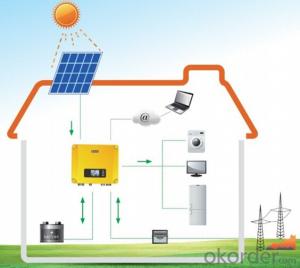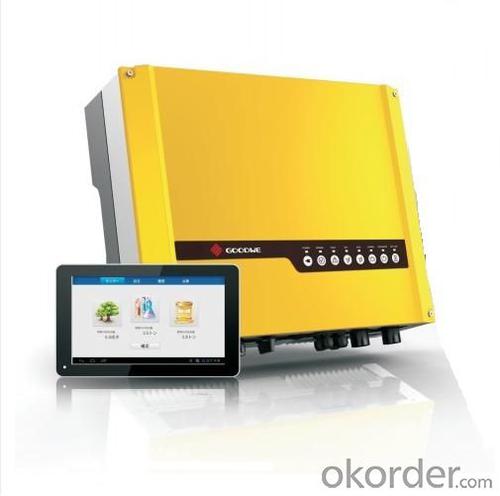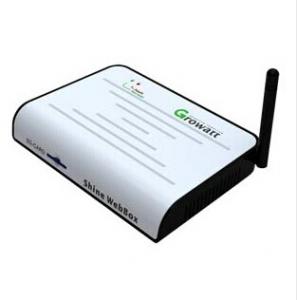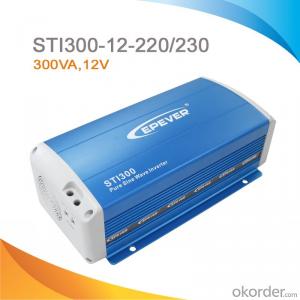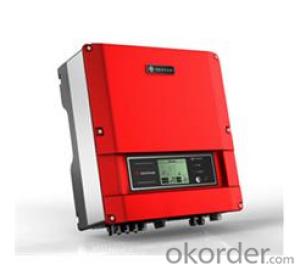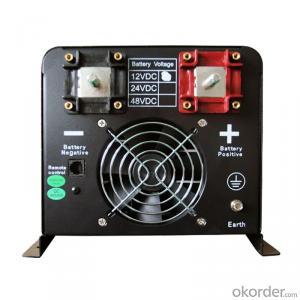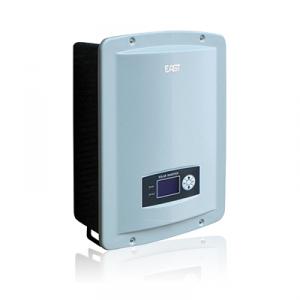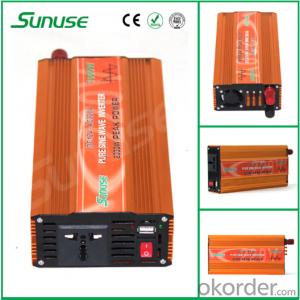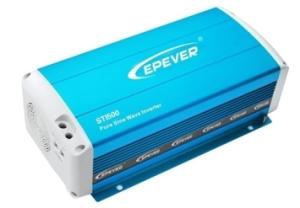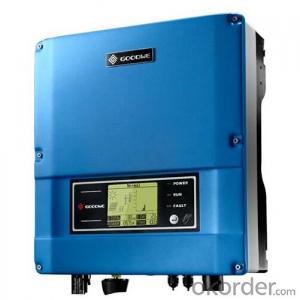Victron Solar Inverter Hybrid GW5048D-ES
OKorder Service Pledge
OKorder Financial Service
You Might Also Like
GW5048D-ES series bidirectional energy-storage inverter is applicable for both on-grid and off-grid PV systems and can control the flow of energy hybrid with its working situation able to be switched automatically or manually. During the day time, the PV plant generates electricity which can be provided to the loads, fed into the grids or charged the battery. The power stored can be released when the loads require it during the night. Additionally, power grid can also charge the storage devices via the inverter..
Datasheet
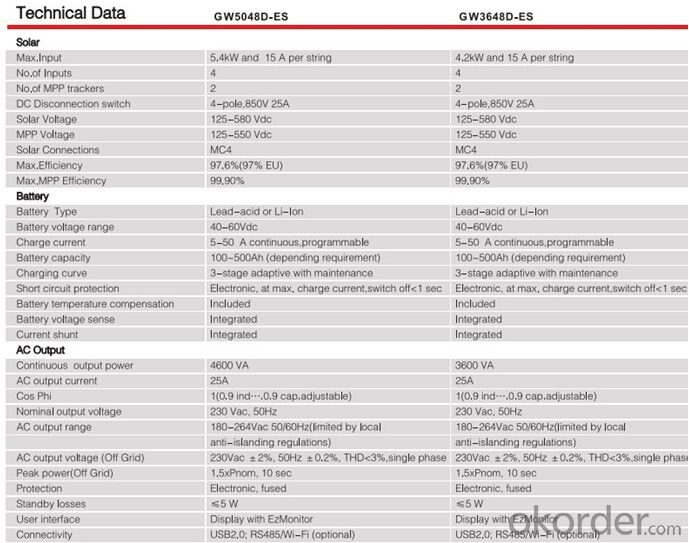
- Q: What is the role of anti-islanding protection in a solar inverter?
- The role of anti-islanding protection in a solar inverter is to ensure the safety of utility workers and prevent damage to the electrical grid in the event of a power outage. It detects when the grid goes down and immediately shuts off the solar inverter, preventing it from continuing to generate electricity and potentially sending power back into the grid. This feature is essential to avoid the risk of electricity flowing into the grid, which could pose a danger to technicians working on power lines and disrupt the stability of the electrical system.
- Q: Can a solar inverter be integrated with energy management systems?
- Yes, a solar inverter can be integrated with energy management systems. Solar inverters can be connected to energy management systems to monitor and control the generation and consumption of solar energy. This integration allows for better optimization of energy usage, real-time monitoring of solar production, and intelligent management of energy flows within a building or grid.
- Q: Can a solar inverter be used in commercial or industrial applications?
- Yes, a solar inverter can be used in commercial or industrial applications. In fact, solar inverters are commonly used in these settings to convert the direct current (DC) generated by solar panels into alternating current (AC) that can be used to power various electrical devices and equipment in commercial and industrial buildings.
- Q: Can a solar inverter convert DC power to AC power?
- Yes, a solar inverter is specifically designed to convert the direct current (DC) power generated by solar panels into alternating current (AC) power that can be used to power household or commercial electrical appliances and be fed back into the grid.
- Q: What is the maximum power output of a residential solar inverter?
- The maximum power output of a residential solar inverter can vary depending on the specific model and capacity. However, on average, residential solar inverters typically have a maximum power output ranging from 3 kilowatts (kW) to 10 kW.
- Q: How long do solar inverters typically last?
- Solar inverters typically last for around 10 to 15 years, although some high-quality inverters can last up to 20 years with proper maintenance and regular inspections.
- Q: Can a solar inverter be used with different types of power conditioning units?
- Yes, a solar inverter can be used with different types of power conditioning units as long as they are compatible and properly integrated into the solar power system. The inverter's specifications and features should be considered to ensure compatibility with the specific power conditioning unit being used.
- Q: Can a solar inverter be used with electric vehicles?
- Yes, a solar inverter can be used with electric vehicles. Solar inverters are used to convert the DC (direct current) electricity generated from solar panels into AC (alternating current) electricity which can be used to power various devices, including electric vehicles. This allows for the charging of electric vehicles with clean and renewable solar energy.
- Q: Can a solar inverter be used with different types of grounding materials?
- Indeed, various grounding materials can be employed in conjunction with a solar inverter. Nevertheless, it is crucial to verify that the grounding system aligns with the manufacturer's prescribed specifications and guidelines for the specific solar inverter. The selected grounding materials must adhere to the essential safety standards and furnish adequate electrical grounding for the solar setup. It is advisable to seek guidance from a certified electrician or solar expert to ascertain the fitting grounding materials for your particular solar inverter and installation.
- Q: Are there any maintenance requirements for a solar inverter?
- Yes, solar inverters require regular maintenance to ensure optimal performance and longevity. This typically includes cleaning the unit and its surroundings to prevent dust buildup, checking for any loose connections or wiring issues, inspecting for physical damage, and monitoring the inverter's performance through regular system checks. Additionally, firmware updates and software upgrades may be necessary to enhance efficiency and address any potential issues.
Send your message to us
Victron Solar Inverter Hybrid GW5048D-ES
OKorder Service Pledge
OKorder Financial Service
Similar products
Hot products
Hot Searches
Related keywords

